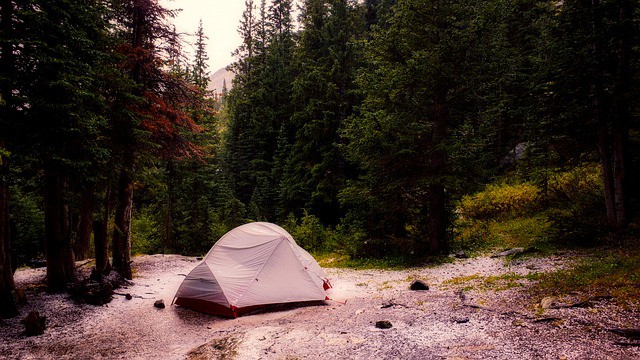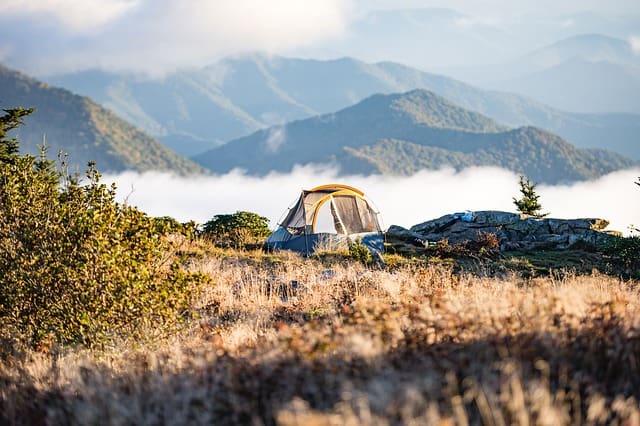Many of today’s campers have really taken to the motto “less is more”.
Even going to the extreme of ultralight camping where campers try to shed every last ounce, by cutting off toothbrush handles or removing unneeded zippers.
While you might not be interested in this form of ultralight camping, we all can certainly benefit from a lighter pack.
These are the lessons I learned while trying to figure out how to camp light and reduce my pack weight.
Camp Light Benefits
Wondering why go through the trouble of reducing camping weight and learn how to camp light? Check out these below benefits of simplifying and reducing the weight of your gear.
Reduces Fatigue and Injury – Lowering the weight of your camping gear will allow you to camp and hike for longer durations without getting as tired. Also carrying less weight while camping and hiking will help reduce the chances of back and knee injuries.
Getting Back to Nature – Reducing the weight and amount of camping gear will lead to a more pure and simple camping experience. Allowing you to focus more on your surroundings and nature and less on all your gizmos and gadgets.
Less to Go Wrong – Reducing the amount and weight of your gear has the added benefit of creating a more simplified camping experience with less to break, worry about, and keep track of.
How to Camp Light and Still be Safe
When camping outdoors never compromise or sacrifice safety while reducing camping weight. No matter what weight reductions might be gained, if you are sacrificing safety it’s just not worth the risk!
Camping Lightweight Safety Tips
- Always have appropriate clothing and shelter for protection from the elements.
- Make sure to have plenty of food and water with some reserves for your camping duration.
- Never eliminate emergency and safety items such as a first aid kit, navigation items such as maps or a compass, firestarter, sun protection, or illumination.
- Never sacrifice quality when reducing gear weight.
Comfortable Lightweight Camping
Just because you’re striving to camp light and reduce camping weight doesn’t mean you have to sacrifice on comfort. While exploring options for reducing your camping weight, you will find there are plenty of lightweight options that still offer plenty of comfort and convenience.
Be aware though when buying quality camping gear, the lighter the weight the more expensive the item can be. This can be for several reasons such as extra engineering and development costs in making the item lighter. Or more expensive materials being used in the manufacturing process to reduce the weight.
Reducing Camping Weight Best Practices
When reducing camping weight the best motto is slow and steady. There are several reasons the slow and steady approach wins out over the quick fix when transitioning to lighter camping gear.
First of all, as mentioned above lightweight camping gear tends to be on the more expensive side so it’s best to spread the cost out over time when acquiring new lighter gear. In addition, if you take your time and think through your reduction in camping weight, you are less likely to make mistakes along the way. Like cutting a necessary item from your gear or replacing an item with a lighter option that doesn’t meet your needs. Remember the journey on how to camp light is a marathon, not a sprint.
For the biggest impact on camping weight reduction and for the most bang for your buck, it’s best to focus on and start with the big four.
The Big Four
The big four or core four camping items include the backpack, tent, sleeping bag, and sleeping pad. These four camping items will be the biggest contributors to your camping weight by far.
By focussing on the big four you can make some sizeable weight reductions, to help get the ball rolling on how to camp light.
Lightweight Backpacks
All camping and hiking gear starts with the backpack. This essential piece of camping gear allows you to carry all other necessary items. So it’s the best place to start when looking for weight reductions.
If you already have a camping backpack start by weighing your existing pack first, to have a point of reference when seeking out a lighter option. If you don’t already have a backpack, staying at or under 4 pounds is a good benchmark to use.
There are two features that add weight to a camping or hiking backpack.
Best Backpack Size to Camp Lightweight
The first is the size of the backpack, typically decent size packs range from about 40L to 75L in size. Obviously, the larger the pack the heavier the pack is going to weigh.
When thinking about pack size looking through the lens of weight, less is more. Since this guide is all about reducing weight going with the smallest size that still meets your needs is the best way to go. Choosing a smaller pack also has the added benefit of limiting the amount of camping gear you can bring along, further helping reduce weight.
While every camper and camping situation is different staying above a 40L capacity is probably best. Anything smaller and the pack will more than likely not be able to hold all your necessary items unless you are going on a short day hike.
In keeping with the theme of how to camp light a good pack size range to stay in is between 50L and 60L. This range in size should meet most camper’s needs without going overboard.
Backpack: Frame or No Frame
The second feature that can add a lot of weight is the addition of a frame. Packs can come with or without a frame but going with a frame is going to add more weight.
To help you decide between a pack with or without a frame its best to consider how you will use the pack. If your planning on using the pack for a short one or two-day camping or hiking trip then frameless may be the best way to go because of the noticeable weight reduction.
If however, you are planning on camping or hiking for more than 3 days you are better off going with a pack that has an internal frame. Any added discomfort from the weight of the frame will more than be compensated for by a reduction in back and shoulder pain.

How to Camp Light with Tents
The next biggest weight contributor to your camping gear is the tent. Tents can range from around 3 pounds to almost 10 pounds in weight, so make sure to check the weight of any tent before purchase.
If your trying to reduce your overall gear weight a good lightweight benchmark for tents is at or under 4 pounds.
There are many things that can add to the weight of the tent so when choosing a lightweight tent it’s important to pick a tent that meets your minimum needs with no excess.
Tent Size
The biggest contributor to tent weight is the size and capacity of the tent. To keep the weight down make sure to pick a tent that is just big enough to accommodate your camping party and no more.
Obviously, one and two-person tents will be the lightest option so if you have a party of 3 or more consider using multiple one or two-person tents. This allows the tent weight to be dispersed among several campers instead of one camper carrying a six-person tent.
The Right Tent for the Right Season
The next biggest weight contributor to the tent is its ability to handle different seasons. For example, a one-season tent consisting of nothing more than a mesh screen and fly for summer use will weigh considerably less than a four-season tent meant to withstand winter.
So as with tent size the key to choosing a tent based on its ability to handle different seasons is to pick a tent that provides no more protection than you need.
Lightweight Sleeping Bags
When reducing the weight of your camping or hiking gear choosing a lightweight sleeping bag is just as important as choosing a lightweight backpack or tent.
A good lightweight benchmark for sleeping bags is under 3 pounds and preferably closer to 2 pounds.
There are two main contributors to weight to sleeping bags including the seasonality rating and the insulating materials used.
As with tents the more seasons the sleeping bag can insulate from the more weight will be added to the sleeping bag. For example, a three-season sleeping bag meant for spring, summer, and fall will typically weigh less than a four-season sleeping bag that can handle cold winter temperatures.
When it comes to insulating material, there are two main choices to consider for sleeping bags including down or synthetic. Down is a lighter weight material but as you can see from the below pros and cons list, they both have advantages and disadvantages.
Down
Pro
- Better insulating to weight ratio compared to synthetic
- Extremely durable with long life span
- Very compressible
Con
- Higher cost compared to synthetic
- Long dry times if it gets wet
- Not hypoallergenic
Synthetic
Pro
- Water resistant
- Hypoallergenic
- Cheaper than down
Con
- Heavier and takes up more space than down
- Not as durable as down
Lightweight Sleeping Pad
Air pads are the most popular choice for modern campers and hikers today when it comes to sleep pads. They are very lightweight typically under 1 pound, provide cushioning from the hard ground and even offer a small insulating effect.
The most popular air pads can be condensed down inside a carrying case to a size not much larger than your hand.
Just because a sleeping pad typically weighs less than a pound though, don’t think weight doesn’t matter on this item. Remember when hiking every ounce counts so it’s important to find the lightest sleeping pad that still meets your comfort needs.
Typical sleeping pads are full body length but if you are looking for ultimate weight savings, consider a torso length sleeping pad. As the name implies these sleeping pads are just the length of your torso so they are much smaller in size and cut additional weight from the sleeping pad.
Of course for ultimate weight reduction, you could opt for no sleeping pad at all. Most campers and hikers find this sacrifice to unbearable though. Coming to the realization that the energy saved from a lighter pack, was negated by an uncomfortable and restless night’s sleep.
How to Camp Light with Food and Water
Food, water, and the gear needed for their consumption are next on the list when it comes to weight in your camping and hiking gear.
Luckily there are many weight-saving tips that can be used, to keep this essential part of your gear as light as possible.
Keeping it Lightweight with Water
The key to how to camp light with water is planning. Before you head out on any camping or hiking trip know where your potential water sources are.
This will allow you to filter and replenish the water you need while camping and hiking as opposed to storing and carrying all the water needed for the duration.
Depending on how remote you are and how plentiful potential water sources are, consider carrying at least a one day supply of water with you.
If you are going to use this technique don’t forget to filter your water first before consumption. There are several great options out there when it comes to water purification including mini filters such as the Lifestraw and water purification tablets.
Also to really keep water weight down some consideration needs to be given to the vessel used for carrying the water supply.
Tips for Choosing a Lightweight Water Container
- Choose a size that is no larger than what you need
- Plastic is lighter than metal
- A soft collapsible water bottle is 80% lighter than a hard plastic water bottle.
Lightweight Food and Camping
When camping and hiking you will burn more calories than usual. So when planning meals and thinking about calorie intake its best to use the estimate of 3000 to 4000 calories of food per person per day.
This may seem like a lot of calories and way more than you are used to consuming in a day. However, due to the physical and strenuous nature of camping and hiking, you will expend more energy than normal and will need a calorie intake to match this level of excursion.
Knowing you need a calorie intake of 3000 to 4000 calories a day the best way to keep camping life simple and the food weight down is to use dehydrated food as your main staple. All you need to do is add hot water to these dehydrated foods and you will have a filling hot meal even while in the great outdoors.
Protein bars are also great while camping as they offer a lot of calories and protein in an easy to consume and lightweight form.

Lightweight Cookware while Camping
Knowing your dehydrated food will require hot water to reconstitute the food, leads us to camping stoves.
There are several different lightweight options for camping stoves and it mainly comes down to personal preference and situation as to which will be best suited for your needs. Some of the more popular stoves for camping include tablet fuel stoves, alcohol stoves, and canister stoves. Check out this complete guide to camping cookware for a more in-depth discussion on camping and hiking stoves.
In addition, remember when taking inventory of your camping cookware look for items that can serve a dual purpose. Instead of bringing a pot and a plate combine the two into one item. The same goes for utensils don’t bring a fork and spoon instead opt for the lighter option of a spork.
Lightweight Miscellaneous Camping Gear
While we have spent a lot of time talking about the big four and some of the heavier camping and hiking items. Don’t forget that every ounce counts when learning how to camp light.
Take a look at all of your gear and make sure there are no additional items that could be cut. Oftentimes new campers and even some seasoned ones bring far more gear than they actually need.
Go through each item of your gear no matter how small or lightweight it might be and decide if you actually use it will camping and hiking. Then once you have eliminated everything you can check to make sure just like we did in cookware that you can not find multi-purpose tools to fill more than one duty to help cut the weight down even further by replacing two items with one.
Final Thoughts
Whether you cut pounds or ounces from your camping gear. Your journey on how to camp light will be rewarded with a lighter pack and more energy to spare while camping and hiking.
Also as an added bonus when you cut weight away from your camping gear you also cut complications away. Leading to a more simple and natural camping experience, allowing you to get back to and feel closer to mother nature.

